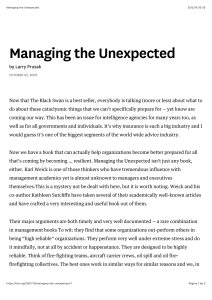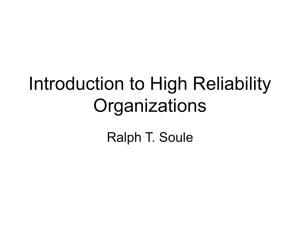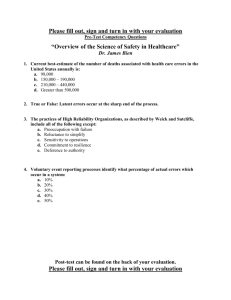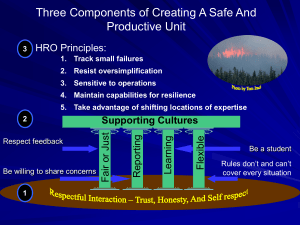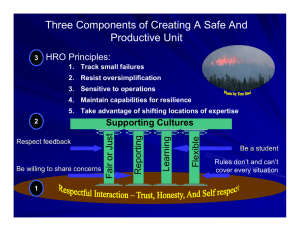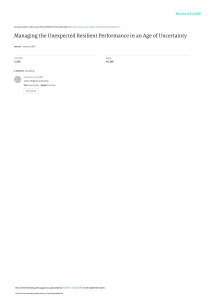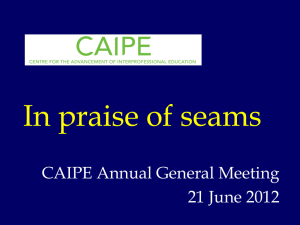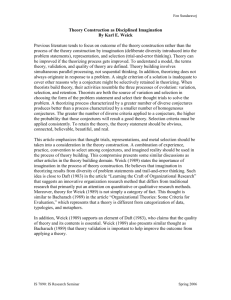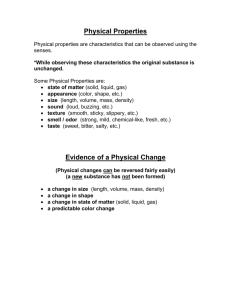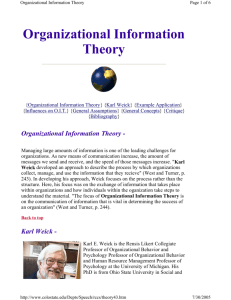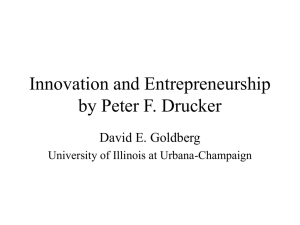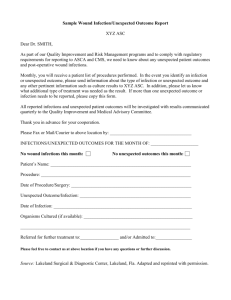5 Habits of Highly Reliable Organizations
advertisement
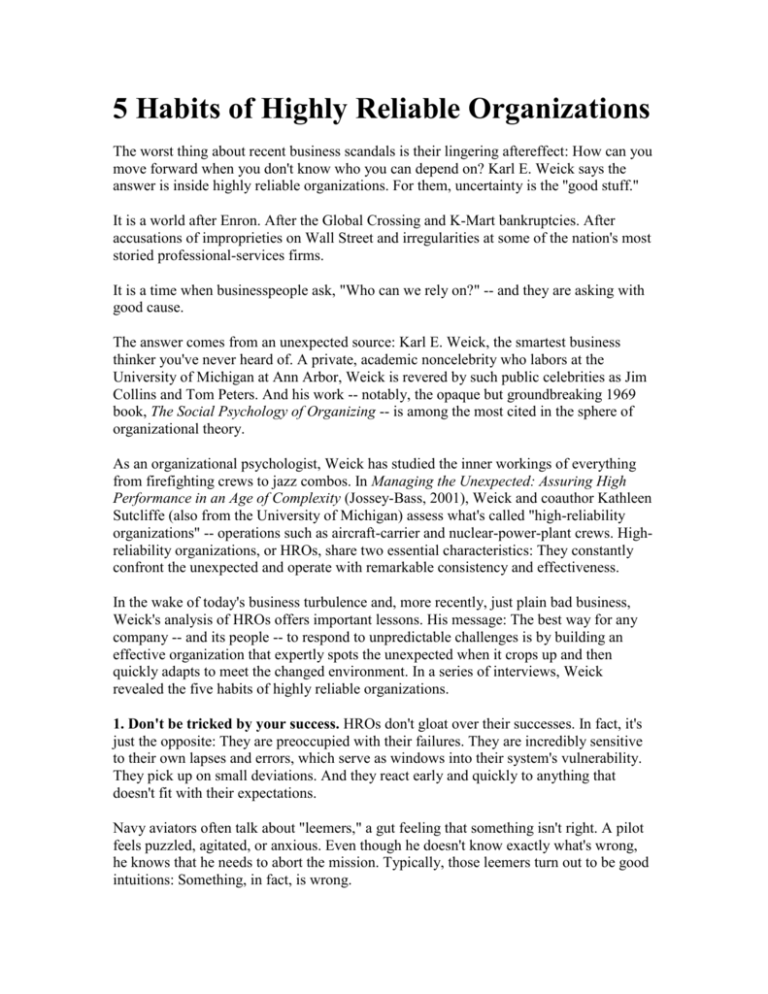
5 Habits of Highly Reliable Organizations The worst thing about recent business scandals is their lingering aftereffect: How can you move forward when you don't know who you can depend on? Karl E. Weick says the answer is inside highly reliable organizations. For them, uncertainty is the ''good stuff.'' It is a world after Enron. After the Global Crossing and K-Mart bankruptcies. After accusations of improprieties on Wall Street and irregularities at some of the nation's most storied professional-services firms. It is a time when businesspeople ask, "Who can we rely on?" -- and they are asking with good cause. The answer comes from an unexpected source: Karl E. Weick, the smartest business thinker you've never heard of. A private, academic noncelebrity who labors at the University of Michigan at Ann Arbor, Weick is revered by such public celebrities as Jim Collins and Tom Peters. And his work -- notably, the opaque but groundbreaking 1969 book, The Social Psychology of Organizing -- is among the most cited in the sphere of organizational theory. As an organizational psychologist, Weick has studied the inner workings of everything from firefighting crews to jazz combos. In Managing the Unexpected: Assuring High Performance in an Age of Complexity (Jossey-Bass, 2001), Weick and coauthor Kathleen Sutcliffe (also from the University of Michigan) assess what's called "high-reliability organizations" -- operations such as aircraft-carrier and nuclear-power-plant crews. Highreliability organizations, or HROs, share two essential characteristics: They constantly confront the unexpected and operate with remarkable consistency and effectiveness. In the wake of today's business turbulence and, more recently, just plain bad business, Weick's analysis of HROs offers important lessons. His message: The best way for any company -- and its people -- to respond to unpredictable challenges is by building an effective organization that expertly spots the unexpected when it crops up and then quickly adapts to meet the changed environment. In a series of interviews, Weick revealed the five habits of highly reliable organizations. 1. Don't be tricked by your success. HROs don't gloat over their successes. In fact, it's just the opposite: They are preoccupied with their failures. They are incredibly sensitive to their own lapses and errors, which serve as windows into their system's vulnerability. They pick up on small deviations. And they react early and quickly to anything that doesn't fit with their expectations. Navy aviators often talk about "leemers," a gut feeling that something isn't right. A pilot feels puzzled, agitated, or anxious. Even though he doesn't know exactly what's wrong, he knows that he needs to abort the mission. Typically, those leemers turn out to be good intuitions: Something, in fact, is wrong. HROs create climates where people feel safe trusting their leemers. They question assumptions and report problems. They quickly review unexpected events, no matter how inconsequential. They encourage members to be wary of success, suspicious of quiet periods, and concerned about stability and lack of variety, both of which can lead to carelessness and errors. 2. Defer to your experts on the front line. There are so many deviations out there, so much dissonance. How do we know what's really worth paying attention to? The answer: Listen to your experts -- the people on the front line. People at the top may think that they have the big picture. More accurately, they have a picture, certainly not the picture, and certainly not bigger in the sense that it includes more data. The picture that frontline workers see is different. It is drawn from their firsthand knowledge of the company's operations, strengths, and weaknesses. What is important about the frontline workers' view is that these people capture a fuller picture of what the organization faces and what it can actually do. In most cases, they see more chances for bold action than the executives at the top. So it's better for HROs to allow decisions to migrate to frontline expertise rather than to the top of preestablished hierarchies, where positions are often filled for reasons other than experience. 3. Let the unexpected circumstances provide your solution. I've written about the Mann Gulch fire that killed 13 smoke jumpers in 1949. In all, it was a tragic organizational failure. But what was amazing was the reaction of the foreman, Wagner Dodge, when the fire was nearly on top of his men. On the spot, he invented the escape fire -- a small fire that would consume all of the brush around him and his team, leaving an area where the larger fire couldn't burn. He acted in a way that was contrary to all of the things that firefighters have habitually done. That's part of being resilient. Put simply, it's about having a steady head. When something out of the ordinary happens, your stress level rises. The safest prediction for what will happen next is that your perception will narrow -- you will get tunnel vision -- and you will miss a lot of stuff. You have to be able to resist that dramatic narrowing of cues -- because within everything that is happening unexpectedly, you will find what you need for a remedy. 4. Embrace complexity. Business is complex, in large part because it is unknowable and unpredictable. In the face of all of this complexity, HROs are reluctant to accept simplification. They understand that it takes complexity to sense complexity. We all instinctively try to simplify the data that we receive, but there are better and worse simplifications. Better simplifications arise from a deeper knowledge of the environment along with a deeper understanding of the organization and its capabilities. That knowledge and understanding develops when people attend to more things, entertain a greater variety of interpretations, differentiate their ideas, argue, listen to one another, work to reconcile differences, and commit to revisiting and updating whatever profound simplicities they settle on as guidelines for action. A complex organization is made up of diverse people with diverse experience. Its complexity fosters adaptability. 5. Anticipate -- but also anticipate your limits. We try to anticipate as much as we possibly can. But we can't anticipate everything. There's such a premium on planning, on budgeting, on making the numbers. In the face of all that, the notion of resilience has an affirming quality: You don't have to get it all right in advance. Good strategy does not rely on anticipation alone. It's built on a smaller scale, updated more frequently, and driven by actions. You don't present it to your board of directors that way, but it's more useful guidance than the kind you can get from a grander notion of strategy. It's not, Think, then act. Instead, it's, Think by acting. By actually doing things, you'll find out what works and what doesn't. That doesn't mean you should stop anticipating. But you should add in two subtleties. First, focus your attention on key mistakes that you do not want to make. Second, trust your anticipations, but be wary of their accuracy. You can't see the whole context that is developing. Your anticipation is probably a reasonable first approximation of what might be happening, but no matter how shrewd you are, it won't cover some key features. Most important, you should build a capacity for resilience. Life events are indeterminate. We can't fix or know everything. The beauty and the frightening quality of hubris is that people believe they're in the know completely. I hope that emergency-room doctors, nuclear-power-plant operators, and firefighters know what the hell they're doing. But I don't believe it for a second. How they struggle with that -- and how you and I struggle with that -- is, for me, the good stuff. That's the human condition. Keith H. Hammonds (khammonds@fastcompany.com) is a Fast Company senior editor. Contact Karl E. Weick by email (karlw@umich.edu). Sidebar: How Mindful Is Your Company? In Managing the Unexpected, Karl E. Weick and Kathleen Sutcliffe argue that highreliability organizations exhibit "mindfulness." Basically, mindfulness indicates a combination of high alertness, flexibility, and adaptability. Take this quiz to rate your company's mindfulness. Give yourself the following number of points for each of the corresponding statements: 1 point for "Not at all," 2 points for "To some extent," and 3 points for "A great deal." 1. There is an organizationwide sense of susceptibility to the unexpected. 2. Everyone feels accountable for reliability. 3. Leaders pay as much attention to managing unexpected events as they do to achieving formal organizational goals. 4. People at all levels of our organization value quality. 5. We have spent time identifying how our activities could potentially harm our organization, employees, customers, other interested parties, and the environment at large. 6. We pay attention to when and why our employees, customers, or other interested parties might feel peeved at or disenfranchised by the organization. 7. There is widespread agreement among the firm's members on what shouldn't go wrong. 8. There is widespread agreement among the firm's members on what could go wrong. A total score higher than 16 indicates an exemplarily mindful infrastructure in your firm. A score lower than 10 suggests a need for immediate improvement.
